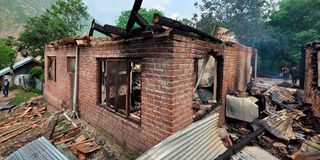Premium
Kenya urges citizens to avoid travel to conflict zones in India, Pakistan

A residential house is pictured after it was damaged by a cross-border shelling in Salamabad.
Kenya's High Commissioner in New Delhi has advised its citizens not to travel to parts of India and Pakistan following a deadly escalation in conflict between the two nations.
It said that Kenyan nationals working and/or living in conflict-prone areas near the India-Pakistan border, including Punjab, Gujarat, Rajasthan, Jammu and Kashmir, have been advised to avoid these areas.
“Where necessary, they are advised to move out until normalcy is restored. Equally, it is advisable to stay informed through local news, maintaining emergency contacts, and registering with the High Commission in New Delhi,” the advisory read in part.
The High Commissioner further shared contacts on how they can be reached “should they encounter any challenges”.
The tensions were the latest in the rivalry between the neighbours, who have fought two wars over Kashmir, a Himalayan region they both claim in full but administer in part.
The latest hostilities threatened to turn into a full-blown war, with both countries refusing to back down and threatening to escalate if the other didn't back down.
Both countries said dozens of people from both sides were killed in four days of fighting last week, including heavy shelling near the de facto border.
Last week, India said it struck infrastructure used by militants linked to April’s massacre of tourists in the Indian-controlled portion of Kashmir.
Tensions have soared between the nuclear-armed neighbours since the attack, which India has blamed Pakistan for backing. Islamabad has denied the accusation.
Shortly after India's airstrikes, a military aircraft crashed in two villages within Indian-administered Kashmir.
Pakistani state media, citing security officials, reported that the country's air force had downed five Indian jets in retaliation but provided no additional details. India did not immediately respond to Pakistan's claim. According to Pakistan's foreign ministry, the Indian strikes originated from within Indian airspace.
In a statement issued late Tuesday, UN spokesperson Stéphane Dujarric said Secretary-General António Guterres had urged both nations to demonstrate "maximum military restraint".
"The world cannot afford a military confrontation between India and Pakistan," the statement warned.
Top military officials from both countries are due to speak later on Monday to discuss finer details of the ceasefire agreed between them on Saturday.
The US-brokered ceasefire between the nuclear-armed neighbours appears to have held overnight after nearly four days of intense shelling and aerial incursions from both sides.
On Saturday, President Donald Trump announced the ceasefire between India and Pakistan, saying it was time to stop the current aggression that could have led to the death and destruction of so many, and so much".
Both nations have ceased hostilities since then but say they remain vigilant, warning each other of the consequences of violating the ceasefire.

